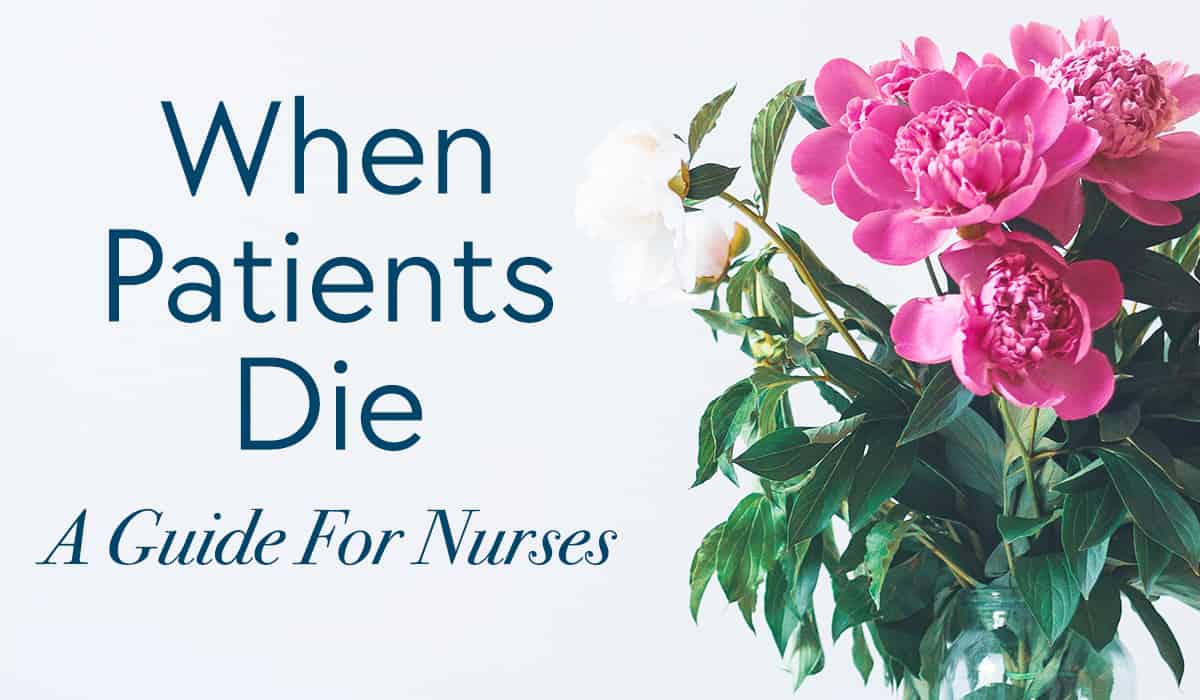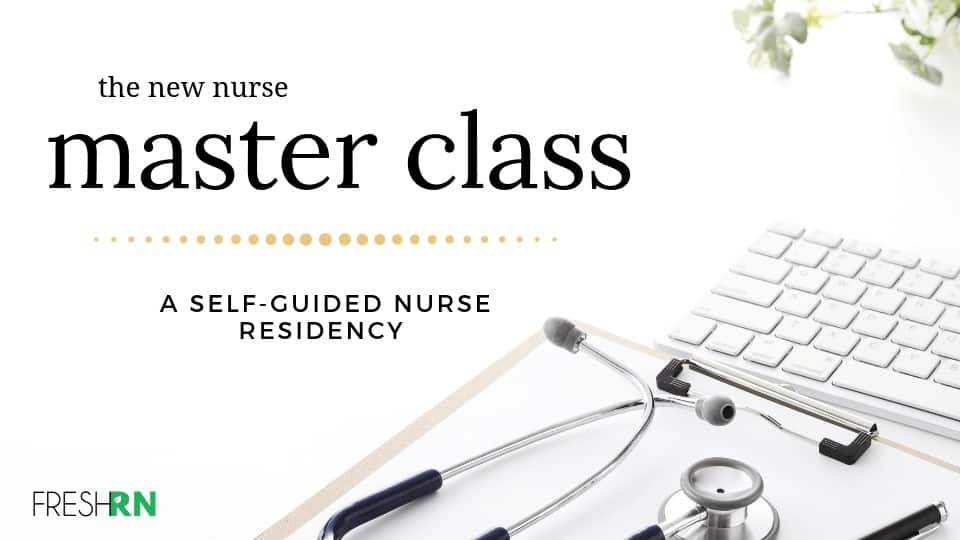How do you react and heal when patients die? This is a sad and emotionally difficult experience for every nurse. And this guide will help you prepare for it or heal from it.

When Patients Die – A Sad Reality for Nurses
If this hasn’t happened in your young nursey career, it will at some point. Whether expected or not, patient deaths can be pretty rough on the nurse, especially if that nurse has developed a relationship with the patient and/or family. Alas, we are still expected to carry on with our day, caring for the rest of our patient load because that’s just part of being a nurse.
I’m going to try and help you prepare for this tough situation. First, there are two kinds of patient deaths – expected and unexpected – and how you react depends on which you are experiencing.
Expected Deaths
When patients die, the expected death is when you were caring for a patient with end-of-life circumstances.
When you have an expected death (a patient placed on comfort care, inpatient hospice, etc), it’s a little different. Typically family is around if not, they need to be notified immediately.
This is an example of something you would say to the family in this situation:
“Mr. Smith, this is your mother’s nurse. I am calling to let you know that your mother passed a few minutes ago.”
This will be done by you, the nurse after you’ve notified the physician. You must let the doc know, but they typically ask if it was expected and that’s that.
Unexpected Deaths
For unexpected deaths (codes) and family is not around, how you notify the family is a little different. This should be done by the attending physician. Or, if they walk in during the code, whoever was running it should inform them.
If the family is not there and needs to be called, tell them they need to get to the hospital NOW. If the patient dies while the family is en route, wait until they get there rather than calling them immediately. You don’t want them to get in an accident.
If they show up during the code, and you’ve done your part (told the code team what happened, answered questions, and let them take over) you should let the family know what happened and see if they want to be in the room or not. Some do and some don’t.
If your state allows it, two nurses auscultating for heart sounds simultaneously for one minute can pronounce a time of death.
Otherwise, if it’s during a code, the physician will call the code. Your unit most likely has a binder/informational checklist for patient deaths that you need to follow precisely.
7 Things You Need to Do When Patients Die
No matter which way a patient dies, there are 7 things that must be accomplished afterward.
#1 Emotionally Support the Family
Grab tissues, call the chaplain, answer questions, basically be there for them. Some may be angry and that’s okay. That’s how some people deal; you never know how people will react. Try to find them someplace private to be if they can’t go into the room just yet.
#2 Ask About Autopsy and Funeral Home Plans
If they have no idea, your case manager/social worker/patient death coordinator probably has a list that you can provide to the family. This is extremely important!
#3 Find Out If This Will Be a Medical Examiner’s Case
These laws/statutes vary from state to state, so I won’t go over them here. But you should know them for where you work. Typically anyone who has fallen, prisoners, children, or those with suspicious deaths will require a medical examiner. You may have to call the coroner, tell them what happened, and they decide.
#4 Remove Lines and Tubes
If they do not want an autopsy and they are not a ME case, then you can remove lines and tubes. If they are, you must leave everything in. If you’ve got some time, get them cleaned up and presentable for the family. Grab a fresh top sheet, remove everything (foleys, IV’s, ETT’s, central lines), try to close their eyes, and clean off any mess left from the code (blood, secretions, etc).
If the family is anxiously waiting, I do a quick skin clean, throw a sheet on, clean up what was left from the code, and let everyone in. Make sure you give the family any jewelry left on the patient (and document what you gave and to whom!). Give them time, privacy, and respect. Don’t rush them.
Typically, hospitals provide grievance trays with water/coffee/juice/muffins/fruit for families so call dietary to see if you can get one.
#5 Put the Patient In A Body Bag
Once the family is done and left, you’ll need to put them in a body bag with appropriate identification. Be ever so gentle, because they’ll bruise very easily since they’re starting to mottle.
#6 Make Pick-Up Arrangements With the Funeral Home
Make sure you get a funeral home name from the family member running the show. You’ll call them once the family is all done. They’ll let you know how soon they can get there to pick up the body. If it’s going to take a while, then you need to send the body down to the morgue and communicate that to the funeral home.
Hospitals usually have security either bring the body down, accompany you, or are the ones that give you access to the morgue. You and your tech may have to bring the body down yourselves.
#7 Verify Paperwork is Together
There is one paper the family needs to sign, a doctor needs to sign a death certificate, and the funeral home needs a form as well. Everywhere has a different process, so I won’t explain that in-depth. Just make sure the family signs what they need to before they leave!
Make sure you’ve charted all that you need to about the event. You should reference your unit’s checklist (if you have one). But after the time of death, you don’t need to document anything on the actual patient because they have passed.
You’ll want to document in a note everyone that you’ve called (funeral home, coroner, house supervisor), where the body was picked up from, and what you did with any belongings on the family. And if the patient was on tele, you need to document a flatline strip. And if they had a pacemaker, your code cart should have a large magnet to place on top of it to stop the pacer from firing.
Know Your Limits
Some nurses/techs cannot deal with dead patients and may ask others to do their post-mortem care. Everyone has their limits. It doesn’t bother me at all but I know it bothers a few of my cohorts. So don’t think you’re a terrible nurse if you can’t do it! Some absolutely fantastic nurses just can’t do it, and that doesn’t make them any less of a nurse. Help your peers out if it doesn’t bother you.
When Patients Die Give Yourself Time to Recover
Don’t forget to give yourself some time to absorb what happened. It can be scary and sad and you still have other patients to care for! Take a break afterward and have someone cover your patients once the death has been taken care of for 15 minutes. Go outside, get some fresh air, cry in the bathroom. But after you have a minute, pull yourself together, rock the rest of your shift, and collapse when you get home.
Just another day living the nurse life.
As always, double-check all of this with your hospital’s policies and procedures because that will be what will always guide your practice.
The FreshRN® New Nurse Master Class is concise, honest, practical, and real. It is the answer to every single burning question I had as a new nurse, and answers to questions I didn’t even know I should be asking. Like, How do I emotionally disconnect from the bedside? How should I eat while working shift work? and so much more. I sat down with multiple healthcare professionals to provide you with the insider information new nurses are desperate to learn – like what level of skill does leadership expect of newbies, how to master nursing reports, and navigate emotionally-charged situations like the leader everyone expects the nurse to be.




0 Comments